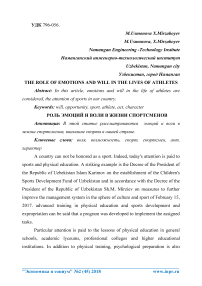The role of emotions and will in the lives of athletes
Автор: Usmonova M., Mirzaboyev X.
Журнал: Экономика и социум @ekonomika-socium
Статья в выпуске: 2 (45), 2018 года.
Бесплатный доступ
In this article, emotions and will in the life of athletes are considered, the attention of sports in our country.
Will, opportunity, sport, athlete, act, character
Короткий адрес: https://sciup.org/140236267
IDR: 140236267
Текст научной статьи The role of emotions and will in the lives of athletes
A country can not be honored as a sport. Indeed, today's attention is paid to sports and physical education. A striking example is the Decree of the President of the Republic of Uzbekistan Islam Karimov on the establishment of the Children's Sports Development Fund of Uzbekistan and in accordance with the Decree of the President of the Republic of Uzbekistan Sh.M. Mirziev on measures to further improve the management system in the sphere of culture and sport of February 15, 2017. advanced training in physical education and sports development and expropriation can be said that a program was developed to implement the assigned tasks.
Particular attention is paid to the lessons of physical education in general schools, academic lyceums, professional colleges and higher educational institutions. In addition to physical training, psychological preparation is also important. Of particular importance is the feeling and motivation in the life of athletes. Let's take a closer look at emotions.
Will is a special form of human activity, whose character is determined by its behavior. The will entered into the labor activity of a person who can control the laws of nature and, therefore, has the opportunity to change it in accordance with his own needs. Iro provides the implementation of two interrelated tasks - the functions of combustion and braking (stopping) and manifests itself. Deactivation is provided by human activities. Activity during the previous situation (when a person turns to a call, turns a ball into a field, gets rid of a rude word, etc.), (in case of anger that allows others to be dishonest, etc.).
Together with the task to promote IRC, the task of stopping is triggered by shocking activity. Man is able to stop the movement and the performance of movements that do not correspond to his highest goal in his worldview. Without stopping, one can not exclude behavior. As can be judged by the rest, we can say that the methods of independent learning of people are different, they all meet the following conditions:
Learning Will must begin with the habit of overcoming the slightest difficulties. A person who is not too busy to cope with a difficult task, and over time overcomes great difficulties and fulfills his will.
Elimination of tensions and obstacles to achieve certain goals. The more important this is, the higher the level of motivational motives, the more powerful it can cope with.
The decision must be carried out. Every time a decision is made and its delay is delayed, we must take into account the purpose and implementation of the decision, which violates the will of the person.
The strength of the field is the cornerstone of the victory of athletes. Therefore, all athletic skills must be present in athletes. It has been scientifically proven that athletes who have received psychological training for future competitions in sports practice often win. Thus, athletes and coaches should pay special attention to training athletes for the competition psychologically.
Used sources:
-
1. Вигоцкий Л.Г. Проблема воли и ее развитие в детском возрасте. Собрал. Стрижка, стр. 2. М., Педагогика, 1982.
-
2. Каримова В.М. Психология. -T., 2000.
-
3. Уздабаев К. Психология пожара. -L., Nauka, 1983.
5. Психология. Учебник. Порт назначения Красный. А. Крылова. -M., 1998.
Немов Р.С. Психология -М., Просвещение. 2004.
"Экономика и социум" №2 (45) 2018
Список литературы The role of emotions and will in the lives of athletes
- Вигоцкий Л.Г. Проблема воли и ее развитие в детском возрасте. Собрал. Стрижка, стр. 2. М., Педагогика, 1982.
- Каримова В.М. Психология. -T., 2000.
- Уздабаев К. Психология пожара. -L., Nauka, 1983.
- Немов Р.С. Психология -М., Просвещение. 2004.
- Психология. Учебник. Порт назначения Красный. А. Крылова. -M., 1998.


